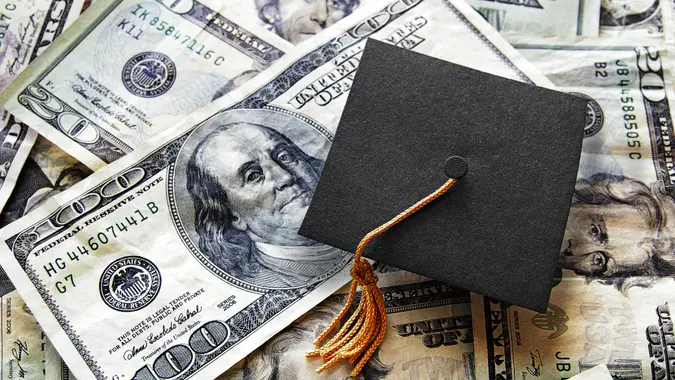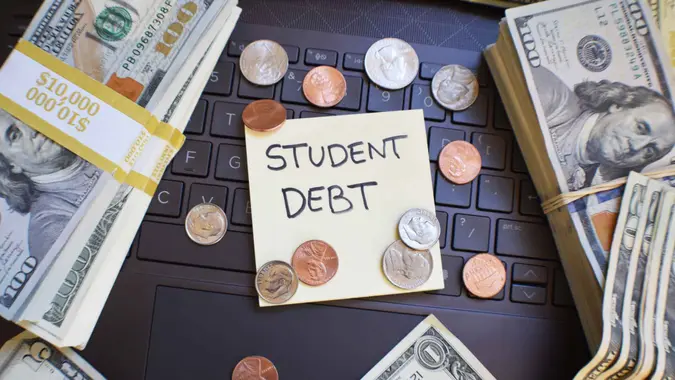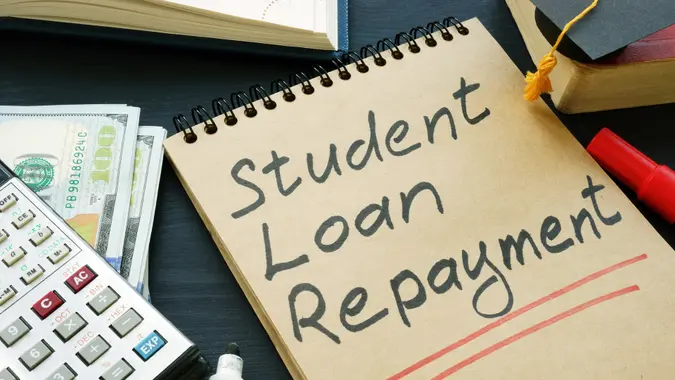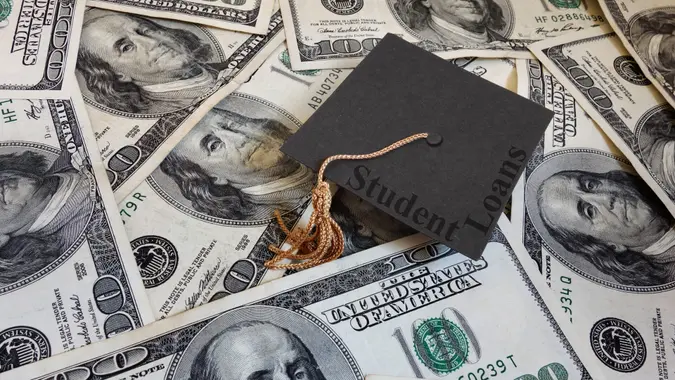What Trump’s Second Presidency Could Mean for Student Loans

Commitment to Our Readers
GOBankingRates' editorial team is committed to bringing you unbiased reviews and information. We use data-driven methodologies to evaluate financial products and services - our reviews and ratings are not influenced by advertisers. You can read more about our editorial guidelines and our products and services review methodology.

20 Years
Helping You Live Richer

Reviewed
by Experts

Trusted by
Millions of Readers
Americans with federal student loans have been in a long limbo as legal challenges to President Joe Biden’s repayment and student loan forgiveness plans have left the programs in stasis. Borrowers may be wondering what to expect and how to plan when President-elect Donald Trump takes office in 2025.
In his first term as president, Trump attempted to do away with the existing Public Service Loan Forgiveness (PSLF) program, which enables federal employees to have their direct loan balances forgiven after a certain number of years or payments. While that did not fly at the time, with a Republican controlled Congress, Trump could very well be able to achieve similar goals the second time around.
Experts weighed in on how Trump’s second presidency may affect student loans.
Changes to Current Repayment Programs
Mark Weinstock, an economics professor at Pace University, does not anticipate any change in current student loan repayment plans, unless they get flagged as unconstitutional by the Supreme Court.
“The impact of these repayment plans has been reflected in the federal budget and are politically a potential headache to reverse for the Trump administration,” Weinstock said.
However, Kevin Shahnazari, founder of FinlyWealth, is not so sure and thinks that Trump’s second administration will likely trigger “significant disruptions in the student loan ecosystem.” He added, “Based on his previous administration’s stance and recent policy discussions, I anticipate substantial rollbacks of existing student loan relief mechanisms.”
Shahnazari believes that current repayment programs “would face immediate scrutiny” and that the administration “would likely seek to dismantle or dramatically restructure income-driven repayment plans that were expanded under the Biden administration.”
These comprehensive plans, which allowed borrowers to cap payments based on income and potentially receive forgiveness after 20 to 25 years, would be prime targets for significant modification or elimination, he said.
The Fate of Loan Forgiveness
As for approving loan forgiveness programs, the Biden administration has met with continued legal resistance, and Weinstock believes it’s highly unlikely that the Trump administration will offer any future student loan forgiveness programs.
“The college age voting population and many college graduates were disproportionately unlikely to have voted for Trump. As he is not beholden to this group, he will not squander political capital on this type of approach,” Weinstock said.
Shahnazari agreed, “Forgiveness programs stand on extraordinarily precarious ground. Trump has consistently been skeptical of broad student loan forgiveness, viewing such programs as fiscally irresponsible.”
In addition, the Supreme Court’s previous blockage of Biden’s mass forgiveness plan provides “political cover” for further restricting loan relief. “I expect any existing forgiveness pathways — particularly those for public service workers, teachers, or those with permanent disabilities — would face severe restrictions or potential complete elimination,” Shahnazari said.
Changes to Federal Student Loan Interest Rates
When it comes to changes in student loan procedures, interest rates and availability under Trump, Weinstock said these things “must be viewed through the lens of Trump’s stated plan to close the Department of Education (DOE) and restore more educational planning and supervision to the state and local levels.”
Trump’s proposed head of the DOE, Linda McMahon, a former World Wrestling Federation executive, agrees with his position that education should be regional in scope, Weinstock said.
“The $1.6 trillion student loan program will remain under federal supervision, but any changes engineered will probably be in the area of conditionality of student eligibility for federally guaranteed student loans with the instructional and administrative policies of schools themselves in refraining from perceived discriminatory policies and heterodox presentations of Western History and culture which Trump has complained about frequently in the past.”
Other Changes
One major change that Weinstock does expect is that student loan forgiveness may be restricted based on the capacity of borrowers to repay their debt. “A major flaw of the Biden approach to loan forgiveness was that it was not adequately means tested based on borrowers’ income. Individuals who were easily able to meet payments based on their income benefitted from previous criteria. This will certainly change.”
Shahnazari predicts that there will be other changes including: “[The] potential privatization of student loan servicing, moving away from federal management, stricter eligibility requirements for federal student aid, increased emphasis on vocational training as an alternative to traditional four-year college paths, and potential reduction in overall federal education funding.”
It’s important to reiterate, Weinstock said, that any changes in student loan forgiveness, eligibility, costs and administration is inextricably tied to the future of the DOE under Trump. “These anticipated changes, whether a downsizing or an elimination of the DOE are inextricably linked to the Trump policies on higher education, in general, and Trump’s position on cultural controversies which he connects back to the current campus climate, in particular.”
How Can Student Loan Borrowers Be Prepared?
Shahnazari recommended that student loan borrowers “maintain flexibility, stay informed about potential policy changes and consider aggressive repayment or refinancing strategies that don’t solely rely on federal forgiveness programs.”
 Written by
Written by  Edited by
Edited by 
























